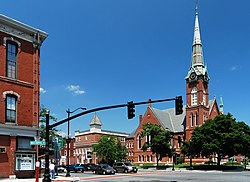Natick
| Natick, Massachusetts | ||
|---|---|---|
| Town | ||

Natick center
|
||
|
||
| Nickname(s): Home of Champions | ||
 Location in Middlesex County in Massachusetts |
||
| Coordinates: 42°17′00″N 71°21′00″W / 42.28333°N 71.35000°WCoordinates: 42°17′00″N 71°21′00″W / 42.28333°N 71.35000°W | ||
| Country | United States | |
| State | Massachusetts | |
| County | Middlesex | |
| Settled | 1652 | |
| Incorporated | 1781 | |
| Government | ||
| • Type | Representative town meeting | |
| Area | ||
| • Total | 16.1 sq mi (41.6 km2) | |
| • Land | 15.1 sq mi (39.1 km2) | |
| • Water | 1.0 sq mi (2.5 km2) | |
| Elevation | 181 ft (55 m) | |
| Population (2010) | ||
| • Total | 32,786 | |
| • Density | 2,171.3/sq mi (838.5/km2) | |
| Time zone | Eastern (UTC-5) | |
| • Summer (DST) | Eastern (UTC-4) | |
| ZIP code | 01760 | |
| Area code(s) | 508 / 774 / 617 | |
| FIPS code | 25-43895 | |
| GNIS feature ID | 0619407 | |
| Website | www.natickma.gov | |
Natick /ˈneɪtᵻk/ is a town in Middlesex County, Massachusetts, United States. Natick is located near the center of the MetroWest region of Massachusetts, with a population of 32,786 at the 2010 census. Only 10 miles (16 km) west from Boston, Natick is considered part of the Greater Boston area. The center of population of Massachusetts in 2000 was located in Natick. A 2014 census shows Natick's population was 34,230. This means between 2010 and 2014 Natick grew 3.6%, making it one of the fastest growing neighborhoods in the Boston area.
The name Natick comes from the language of the Massachusett Native American tribe and is commonly considered to mean place of hills. However, a more accurate translation may be place of (our) searching, named to celebrate John Eliot's successful search for a location for his Praying Indian settlement.
Natick was first settled in 1652 by John Eliot, a Puritan missionary born in Widford, Hertfordshire, England who received a commission and funds from England's Long Parliament to settle the Massachusett Indians on both sides of the Charles River, on land deeded from the settlement at Dedham. They were called Praying Indians – Natick was the first and for a long time served as the center of Eliot's network of praying towns. While the towns were largely self-governing under Indian leaders, the praying Indians were subject to rules governing conformity to English Puritan culture (in practice Natick, like the other praying towns, evidenced a combination of traditional and English culture and practices). Eliot and Praying Indian translators printed America's first written Bible in the Algonquian language.
...
Wikipedia

